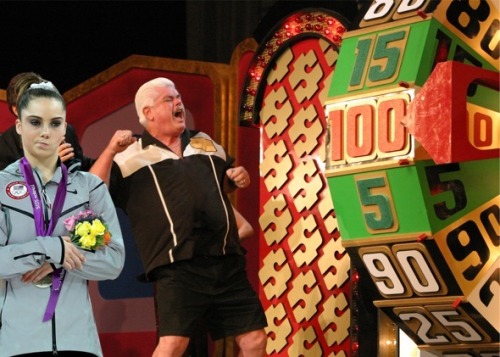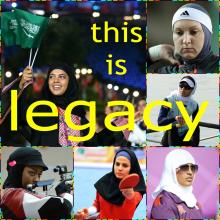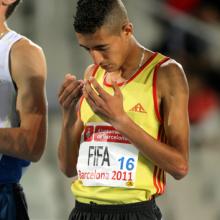2012 Summer Olympics
They call her the "Flying Squirrel" — Gabby Douglas, the pint-sized fire-cracker who won two gold medals (and the hearts of millions) at the 2012 Summer Olympics.
Gabby can flip, tumble, vault, balance, swing, totally stick the landing, throw out the first ball at a Dodgers game, charm Jay Leno and Howard Stern (try that, Michael Phelps!), and high-five the First Lady — all the while exuding confidence, good humor and the greatest of ease through her cajillion-watt smile.
So, what's next for the 16-year-old wonderkid?
A tell-all book... about her Christian faith.
Gabby is working on her first book — a memoir titled Grace, Gold, and Glory: My Leap of Faith — which is expected to be published at the end of the year, according to an announcement made today by the Christian publishing house, Zondervan.
U.S. gymnast McKyala Moroney is not impressed with much in this new Tumblr page --- four sisters recreate childhood photos --- designer public toilets in New Zealand --- remembering author and journalist David Rakoff --- vintage photos of bulldogs wearing human clothing in the early 1900s. See these and more in today's Links of Awesomeness...
Usain Bolt vs. a cheetah --- Beck plans to release new album entirely in sheet music --- Longform launches debut podcast --- Shark Week finds rival with "animals that act like sharks week" --- fascinating infographics on Olympic bodies. See these and more in today's Links of Awesomeness...
The uneven bars is an Olympic event that only women compete in. (Men compete in variations on the event, in the single horizontal bar and the parallel bars.) But back in 1981, U.S. gymnast Paul Hunt decided to surprise a crowd in Madison Square Garden by performing an uneven bar routine while donning a bright pink leotard and bow. Unfortunately the video doesn’t have the greatest audio quality, but one can imagine the burst of laughter as he bounces back and forth. [via Perez]
Dozens of Muslim women are competing at the 2012 Summer Olympics in London — several of them as the very first female athletes chosen (and allowed) to represent their countries in the Olympic games.
These women are vanguards, shattering stereotypes, subverting cultural-religious mores, and creating a legacy that will benefit female Olympians of all creeds for years to come.
As has been widely reported and celebrated (in many quarters), Saudi Arabia sent two women athletes to represent the Arabic nation for the first time at the Olympic games — 16-year-old judoka (judo competitor) Wodjan Ali Seraj Abdulrahim Shahrkhani and 800-meter runner Sarah Attar, 19.
Attar, who is a California-born American but holds dual-citizenship in the Arabian kingdom because her father is Saudi, trains in San Diego, not far from Pepperdine University where she is a junior art major and also runs on the university's track team.
Shahrkhani, whose father is a judo coach and an international referee in the sport, won a dispute with Olympics officials earlier this week to be allowed to compete while wearing her hijab or traditional head covering worn by many observant Muslim women.
Saudi Arabia is not the only majority Muslim country sending its first women competitors to the Olympics. Brunei and Qatar also followed suit, sending five female athletes in total. Runner Maziah Mahusin is the lone woman on Brunei's three-person Olympic team. Qatar's four women Olympians are swimmer Nada Mohammed WS Arakji, sprinter Noor Hussain Al-Malki, table tennis player Aia Mohamed, and air rifle competitor Bahia Al-Hamad.
Both Mahusin and Al-Hamad were chosen as flag bearers for their nations at the opening ceremonies in London last week. Twelve majority Muslim countries — Tajikistan, Qatar, Morocco, Indonesia, Turkey, Jordan, Iraq, Djibouti, Comoros, Brunei, Bahrain, and Albania — chose women as flag bearers at the opening ceremonies that were viewed by an estimated 1 billion people worldwide.
When the Summer Olympics opened in London, there was a version of a religious ritual in the Olympic oath, procession of athletes and lighting of the flame. This was no accident because the modern Olympics have religious roots, though they appear to have largely secular fruits.
I'm reminded of this fact because it was in London in 1908 that Anglican Bishop Ethelbert Talbot first said, "The most important thing in these Olympics is not so much winning as taking part" — a phrase that became part of the Olympic creed. He was following in the footsteps of the Rev. Henri Didon, a Catholic priest who gets credit for the official Olympic motto "citius, altius, fortius" (faster, higher, stronger).
The founder of the modern Olympics, Baron Pierre de Coubertin, was educated by Jesuits. "The first essential characteristic of the Olympics, both ancient as well as modern, is to be a religion … above and outside the churches," he said. He was influenced by proponents of "muscular Christianity," who turned away from traditional Christian contempt for the body and used sports as a method of strengthening faith and morality.
Muscular Christianity became popular in Victorian England and spread to the U.S., where it shaped the programs of the YMCA and Boy Scouts of America, as well as church sports leagues. Although it declined in mainline Protestantism in the 20th century, it remained strong in evangelical organizations, such as the Fellowship of Christian Athletes and Promise Keepers. Today, muscular Christianity is alive and well in professional athletes such as Tim Tebow and Jeremy Lin.
Americans cheered when Aly Raisman of Needham, Mass., won a gold medal on Tuesday in the women’s all-around gymnastics competition, but at least some American Jews likely cheered a little louder.
“For people who are part of a minority, to see one of your own have this international recognition gives you enormous satisfaction and pride,” said Rabbi Keith Stern of Temple Beth Avodah in Newton Centre, Mass., where Raisman has worshipped since childhood. “It lets you say, ‘Look at what we’ve managed to do.’”
Members of minority faiths in the U.S. — Jews, Muslims, Hindus and Sikhs — are rooting for U.S. Olympians and also saving a few extra cheers for their co-religionists, both Americans and athletes from other teams. Before they go to bed or when they wake up, they scan lists of medal winners and competition results, looking for names that might sound Jewish, Muslim, Hindu or Sikh.
But why?
In a sense, religion isn't supposed to matter in who a fan roots for, said Harold U. Ribalow, author of three books about Jewish athletes, trying to answer that question. But, he added, the evidence was overwhelming that people like to see those from their own groups do well, especially in the root-for-the-underdog world of sports.
A monkey finds hidden camera at the zoo, photographs self --- big slumber party hits IKEA --- Peter jackson confirms The Hobbit will be three films --- and check out some of the funniest faces in the Olympics. See these and more in today's Links of Awesomeness...
Big Olympic news today from Reutuers:
China has vehemently rejected suggestions of doping as a growing row over the astonishing performance of a Chinese swimmer threatens to overshadow Michael Phelps’s bid to become the most decorated Olympian of all time on Tuesday.
For those of you who don’t speak in sports lingo or Britishisms, that translates to “Chinese coaches reject claims that their star swimmer, Ye Shiwen, has been taking illegal, performance-enhancing drugs.”
Here’s the context. Yesterday, Ye Shiwen, a 16-year-old Chinese woman swam the 400 meter medley faster than all-star swimmer Ryan Lochte, a man from the U.S.A.
WHAT??!! Throw up the red flag! Women can’t be better than men at sports! Call in the drug dogs and blood tests. (The Twitterverse and other social media quickly echoed similar sentiments, rolling their collective eyes at outrage that a woman could break a man's speed.)
According to the report, Ye Shiwen went through "extremely thorough" tests from the World Anti-Doping Agency, and the British Chairman of the Olympic Association said she’s clean.
"That's the end of the story. Ye Shiwen deserves recognition for her talent."
If you're following the 2012 Summer Olympics, you probably know that China currently holds the overall team-lead with 14 medals in total.
But if you're looking to see how many medals Djibouti or Bangladesh have won so far, you may find yourself out of luck... that is unless you visit Medal Count.
Dedicated to covering every country at the London games, the site allows you to stay the most up-to-date with whatever country or medal you wish to follow. It even allows you to choose which events or areas you want to follow.
To coincide with the opening of the 2012 London Olympics on Friday, Christianity Today had an insightful profile of Team USA member and former "Lost Boy" — runner Lopez Lomong, who was abducted from his home in Sudan during the 20-year long civil war.
According to the profile:
That story starts in 1991, when Lomong's home village of Kimotong was attacked by rebels in the second Sudanese civil war. "I was 6 years old when I was abducted at church, which met under a tree," Lomong told Christianity Today at his training base in Portland, Oregon. "They ripped my mother's arm from me, throwing me and other boys into a truck; they blindfolded us, then drove us to a prison camp that trained rebel soldiers."
Lomong and a small group of boys managed to escape from the torturous conditions they found themselves in, and found their way to a refugee camp near the Kenyan capital of Nairobi, where Lomong “remained for 10 years.”
 Not only are they the best athletes of their generation, but they’re also solid lip syncers…
Not only are they the best athletes of their generation, but they’re also solid lip syncers…
Yes, it’s the video you’ve all been waiting for:
The USA Olympic Swimming Team takes some time off from the pool and does ‘Call Me Maybe’!
Watch it ... inside the blog.
 Billions will tune into the Summer Olympics in London over the coming weeks, excited to see their favorite athletes competing for those coveted Gold Medals.
Billions will tune into the Summer Olympics in London over the coming weeks, excited to see their favorite athletes competing for those coveted Gold Medals.
Hundreds of thousands more will brave the wind and rain of the traditional British ‘summer’ (this year, summer will officially be on August 13 if you’re interested) to enjoy the Games in person and literally some people will watch the Trampolining (because those were the only tickets that were left, let’s be honest).
Everyone is anticipating a wonderful event with great excitement, which will display the very best of what Britain has to offer.
Excuse me, did you say excitement? Are you having a bubble? [Editor’s note: “bubble” is Cockney rhyming slang for laugh…]
Hear what "average" Londoner Brick-laying Bertha (with an assist from Monty Python's Terry Jones) has to say about this year's games inside the blog.
When I was a sophomore at Bethel University, I was the top 1,500-meter runner on my track team. Then, my junior year, a transfer student came, and she was really fast. She quickly took my place as the fastest miler on the team, winning multiple national championships in the process.
I’ll admit to having felt a little bit frustrated because she came in from the outside and passed me up. But training with her is one of the key reasons I was ultimately able to finish sixth at the national meet, good enough to earn All-American honors.
She pushed me to become better. She gave me someone to chase. She brought more attention to our school and our team, resulting in more fast recruits. In short, she made me and our whole team better.
As the London Olympics begin this week, the United States counts many “transfers” — immigrants from all over the world who are now U.S. citizens — among its top athletes. Some people may feel threatened by these immigrants because they are potentially taking the place of others who were born here.
But I think our immigrants make us better, just like my transfer teammate made me better. They continually push us to do better, work harder and find new ways to improve.
 The 2012 Olympic games are approaching quickly. This Friday, more than 10,000 athletes will gather in London to celebrate athleticism and competition in 26 sports. While the hype of an event like this may drive athletes to revel in the spotlight, others find it’s the best avenue for an intimate connection with God.
The 2012 Olympic games are approaching quickly. This Friday, more than 10,000 athletes will gather in London to celebrate athleticism and competition in 26 sports. While the hype of an event like this may drive athletes to revel in the spotlight, others find it’s the best avenue for an intimate connection with God.
At this year’s games, the United States boasts a plethora of athletes, but alongside incredible athleticism, some are gaining attention for their personal faith.
A 600-foot footrace was the only athletic event at the first Olympics, a festival held in 776 B.C. and dedicated to Zeus, the chief Greek god.
For the next millennium, Greeks gathered every four years in Olympia to honor Zeus through sports, sacrifices and hymns. The five-day festival brought the Greek world together in devotion to one deity.
What began in ancient Greece as a festival to honor a single god, Zeus, has now become an almost Olympian task, as organizers of the games navigate dozens of sacred fasts, religious rituals and holy days.
The London Olympics will try to accommodate religious athletes with 193 chaplains, a prayer room in every venue and a multifaith center in the Olympic Village.
Athletes at the ancient Olympics believed their training honored the gods, and victory was a sign of favor from a deity. As contests like wrestling, boxing, and horse racing were added to the Olympic roster, they supplemented devotional sacrifices, hymns, and ceremonies.
“The idea was that you were training to please Zeus. But part of the festival would be to visit the temple, visit the cult statues, making offerings, celebrating and seeing your family,” said David Gilman Romano, a professor of Greek archaeology at the University of Arizona.
The combination of Greek sport and worship led the Roman Emperor Theodosius I, a Christian, to ban the Olympics in 393 A.D.
JERUSALEM — Despite international pressure — including support from both U.S. presidential candidates — the International Olympic Committee has refused to include a moment of silence at Friday's (July 27) opening ceremony for Israeli athletes killed by terrorists at the games 40 years ago.
President Obama and his likely GOP challenger, Mitt Romney, have both called for the IOC to honor the 11 Israelis murdered in Munich in 1972.
"We absolutely support the campaign for a moment of silence at the Olympics to honor the Israeli athletes killed in Munich," Obama spokesman Tommy Vietor said in a statement.
IOC President Jacques Rogge said a smaller, more somber ceremony would better memorialize the tragedy.
IOC officials made a brief statement and held a moment of silence on Monday during a pre-Olympics event in London, where the 2012 games begin on Friday.
"I would like to start today's ceremony by honoring the memory of 11 Israeli Olympians who shared the ideals that have brought us together in this beautiful Olympic Village," Rogge said.
This year, more than 3,000 Muslim athletes will compete in the Olympics, but many will not fast, a decision that has been sanctioned by religious authorities. While Muslims are increasingly common on Western teams -- for example British rower Mohamed Sbihi and French boxer Rachid Azzedine -- no Muslims made the U.S. team this year.
Nyambui said the hard part about track is training. Competing is easy. Had Ramadan occurred before the Olympics, when athletes prepare their bodies for competition, then his performance would have suffered, he said. He acknowledged that fasting can present difficulties for athletes, but usually only during the first or second weeks of Ramadan when the body is still adjusting to the rigors of fasting.
“After that people are used to it,” said Nyambui, speaking from his office in Dar es Salaam, Tanzania's largest city. “People play soccer, they can go jogging, they can go swimming.”
It’s just 10 days until the biggest show on earth begins.
No, not Lady Gaga’s new tour. It's the 2012 Summer Olympics in London.
The timing of this year’s Olympics has put thousands of participating athletes in something of a quandary.
Writing from TIME Magazine, Aryn Baker explains:
When an estimated 3,500 Muslim athletes come to the London Olympics this summer, the pinnacle of their athletic careers will directly coincide with one of the most important periods in their spiritual calendar. This year, all 17 days of athletic competition take place during the holy month of Ramadan, when Muslims are required to fast and refrain from drinking water from sunrise to sunset....











